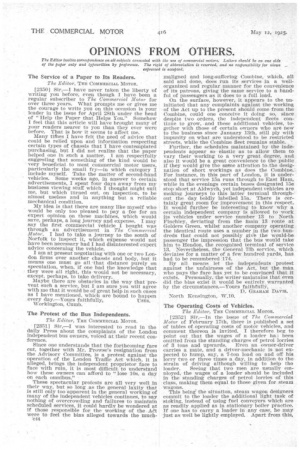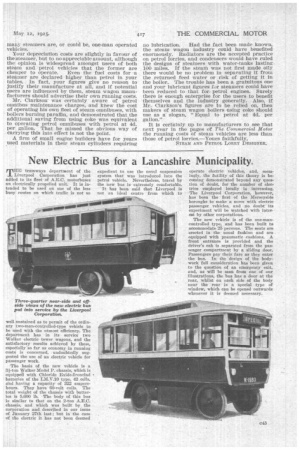OPINIONS FROM OTHERS.
Page 28

Page 29

If you've noticed an error in this article please click here to report it so we can fix it.
The Editor invites correspondence on all subjects connected with the use of commercial inotors. Letters should be on one side of the paper only and typezvritten by preference. The right of abbreviation is reserved, and no responsibility for views .._
expressed is accepted.
The Service of a Paper to Its Readers.
The Editor, Tx i COMMERCIAL MOTOR.
[23501 Sir,—I have never taken the liberty of writing you before, even though I have, been a regular subscriber to The Commercial Motor for over three years. What prompts me or gives me the courage to write you on this occasion is your leader in the issue for April 28th under the head of "Help the Paper that Helps You." Somehow I feel that this article will have brought many of your readers nearer to you than they ever were before. That is how it seems to affect me.
Many tithes I have felt the need of advice that I could be relied upon and information respecting certain types of chassis that I have contemplated purchasing, but I did not realize that the paper helped one in such a matter. I am respectfully suggesting that something of the kind would be very beneficial_ to most conamercial motor users, particularly the small fry—in which category I include myself. Take the matter of second-hand vehicles. Some weeks ago, in answer to certain advertisements, I spent four days away from my business viewing stuff which I thought might suit me, but which turned out, on inspection, to be almost useless and in anything but a reliable mechanical condition.
My idea is that there are many like myself who swould be only too pleased to pay a -fee for an expert opinion on these machines, which would save, perhaps, a long journey and expense. I may say the first commercial vehicle I bought was through an advertisement in The Commercial Motor. I had to take a journey to the south of Norfolk to inspect it, which expense would not have been necessary had I had disinterested expert advice concerning the vehicle.
I am at present negotiating with one or two London firms over another chassis and body, but it means one must go all -that distance purely on speculation, when, if one had the knowledge that . they were all right, this would not be necessary, except, perhaps, to take delivery. Maybe there are obstacles in the way that -prevent such a service, but I am sure you will agree with me that it would be of great help in such cases as I have mentioned, which are bound to happen every day.—Yours faithfully., USER. Workington, Cunab.
The Protest of the Bus Independents.
The Editor, THE COMMERCIAL MOTOR.
[23511 Sir,—I was interested to read in the daily Press about the complaints of the London independent bus owners, voiced at their recent conI ference.
Since one understands that the forthcoming fare cut, together with Mr. Prowse's resignation from the Advisory Committee, is a protest against the operation of the London Traffic Act which, it is alleged, brings the independent proprietor face to face with ruin, it is most difficult tá understand how these owners can afford to "lose 10s. a day on each omnibus."
These spectacular protests are all very well in their way, but so long as the general laxity that Is still only too 'apparent in the general working of many of the independent vehicles continues, to say nothing of overcrowding and failures to maintain scheduled services, it could hardly be wondered at If those responsible for the working of the At were to feel the bias alleged towards the much
'e44
maligned and long-suffering Combine, which, all said and done, does run its services in a wellorganized and regular manner for the convenience of its patrons, giving the same service to a handful of passengers as it does to a full load. On the surface, however, it appears to the uninitiated that any complaints against the working of the Act up to the present should come from the Combine, could one conceive it doing so, since despite two orders, the independent fleets continue to grow, -and these additional vehicles, together with those of certain owners who are new to the business since January 13th, still ply with impunity on what are understood to be restricted streets, while the Combine fleet remains stable. • Further, the schedules maintained by the independents appear so elastic as to allow them to vary their working to a very great degree, and also it would be a great convenience to the public if they would give the same attention to the designation of short ,workings as does the Combine.For instance, in this part of London, it is understood that service 15a runs through to East Ham, while in the evenings certain buses designated 15e stop short at Aldwych, yet independent vehicles are making journeys to this latter terminal thronghout the day, boldly labelled 15a. There is certainly great room for improvement in this respect. It would further be interesting to know why a certain independent company is allowed to .work its vehicles under • service number 13 to North Finchley, deviating from the fnain 13 route at Golders Green, whilst another company operating the identical route uses a number in the tWo-hundreds that could not possibly giVe the would-be passenger the impression that the bus would take him to Hendon, the recognized terminal of service 13. Nevertheless, the General 73b service, which deviates for a matter of a few hundred yards, has had to be renumbered 174.
By all means let the independents protest against the unfairness of the Act, but the man who pays the fare has yet to be convinced that it exists. Personally, the writer .maintains that even did the bias exist it would be entirely, warranted. by the circumstances.—Yours faithfully, . D. GRAHAM DAVIS. North Kensington, W.10.
The Operating Costs of Vehicles.
The Editor, THE CommEHotAL Mown. • [23521 Sir,—In the issue of The Commercial Motor of February 17th, there is published a set of tables of Operating costs of motor vehicles, and comment thereon is invited. I therefore beg to point out _that the wages of a loader ha i been omitted from the standing charges of petrol lorries of 3 tons and upwards. Even an owner-driver carries a mate, and a driver-mechanic is not expected to hump, say,' a 7-ton load on and off his lorry two or three times a day, in addition to the strain of driving although willing to help the loader. Seeing that two men are usually employed, the wages of a loader should be included in the standing charges of petrol lorries of this class, making them equal to those given for steam wagons. This being' the situation, steam wagon designers commit to the loader the additional light task of stoking, instead of using fuel conveyers which are as readily applied as in stationary boiler practice. If one has to carry a loader in any case, he may just as well be lightly employed. Apart from this, • many steamers are, or could be, one-man operated 'vehicles.
Your depreciation costs are slightly in favour of the steamer, but to no appreciable amount, although the opinion is widespread amongst users of both steam and petrol vehicles that the former are cheaper to operate. Even the fuel costs for a steamer are declared higher than petrol in your tables. In fact, your figures give no reason to justify their manufacture at all, and if potential users are influenced by them, steam wagon manufacturers should advertise their own running costs. Mr. Clarkson was certainly • aware of petrol omnibus maintenance charges, and knew the cost of operating his own fleet of steam omnibuses, with boilers burning paraffin, and demonstrated that the additional saving from using coke was equivalent to operating petrol omnibuses with petrol at 4d. per gallon. That he missed the obvious way of carrying this into effect is not the point.
A firm of small engine builders have for years used materials in their steam cylinders requiring no lubrication. Had the fact been made known, the steam wagon industry could have benefited enormously. Radiators are the accepted practice on petrol lorries, and condensers would have ruled the designs of steainers with water-tanks lasting 100 miles. If the steath was not first made oily there would be no problem in separating it from the returned feed water or risk of getting it in the boiler. The trouble has been a gratuitous one and your lubricant figures for steamers could have been reduced to that fori petrol engines. Surely there is enough enterprise for the users to benefit themselves and the industry generally. Also, if Mr. Clarkson's figures are to be relied on, then makers of steam wagon boilers using coke should use as a slogan, "Equal to petrol at 4d. per gallon."
It is certainly up to manufacturers to see that next year in the pages of The Commercial Motor the running costs of steam vehicles are less than those of petrol lorries,—Yours faithfully,
STEAM AND PETROL LORRY DESIGNER;
































